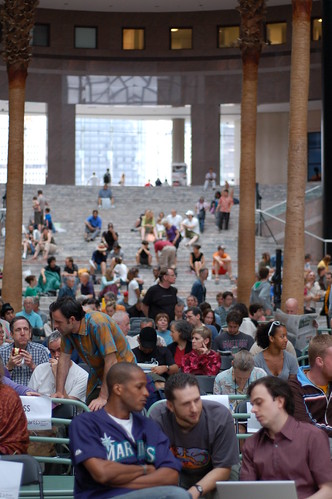

As the 'bang on a can' Festival celebrates its 21st birthday, I couldn't help but marvel at the longevity of a festival that fosters a genre of music that at best can be popularized by a few tepid, high-brow audiences. Patient and eager, the youth at the festival visibly outnumbered the old. I had to smile--it was good to know that young people were embracing new-music however unsettling it may seem at first. Especially in our society's culture, where popular music promotes short-attention spans, this music requires a meditative patience and a mentality that exclaims, 'you get out of it what you put into it'. At least that's my take on it.
Usually attending a contemporary-classical concert is bittersweet: despite great musical ambition, the audience is usually left with the feeling that the music is imminent--that it's awaiting a long death, terminating with cancer. But this audience--so cool and collected--projected an energy that instilled in me a new found optimism that this music is alive and well...and weird.
Perhaps this idea was best illustrated by the Michael Gordon composition for the Young People's Chorus of New York City entitled "Every Stop on the F Train." This piece chronicled the subway route stop-by-stop of the NYC Metro's F train. The composition introduced various forms of rhythmic devices such phasing and metric modulation that increased in complexity as the piece unfolded. Additionally, the composition was full of rapid harmonic changes and key modulations--requiring the utmost skill in its execution. And here's where the most striking aspect of the piece comes in: it was sung by 12 year olds...Well, some of the members were older (the oldest being 18) but the average age was probably about 15. For the first time, I realized that I no longer represented the youngest constituent listening to the music--that this younger generation was performing it...and really nailing it! Gordon probably divided each section (sop/alto etc..) into more than 3 parts, demanding that every single member exert absolute mastery over their respective lines.
The festival also highlighted some other really awesome pieces and genres including a performance of Reich's "Daniel Variations" (Reich was in attendance), Stockhausen's "Stimmung" and even a performance by the indie-rock-dance master, Dan Deacon (complete with a mosh-pit and crowd-surfing at 4 am). This free concert is held every year in the summer and is a twelve hour long event with performances starting at 6pm and ending at 6am the following day. Almost every composer with a piece being performed was in attendance and gave a short introduction to each piece prior to the performance. The festival was held in the financial district of Manhattan in a huge atrium overlooking the Hudson River called the Winter Garden which afforded the especially devout bang on a can festival-goer to witness the sunrise to Stockhausen's "Stimmung", the final piece to conclude the 12 hour event.
As I walked back to my place in the east village, my legs and back sore from all the standing in the past 12 hours, I could find consolation in the possibility that this was a feeling I could share with all the other festival goers who decided to stick around until the end--that we were apart of a community that is keeping this beautiful music alive, sore muscles and all.

1 comment:
I'm jealous, Nolan. Bang on a Can occupies a singular place in the new music landscape: they manage to be both artsy and obtuse, and decidedly pop and youth-oriented. Actually using a young person's choir for a composition, however, brings new meaning to that term.
In addition to the compositional aesthetic of the Bang on a Can musicians, it's interesting to see how the concert format itself is reimagined at the festival to connect to younger people. What you describe strikes me as closer in tone to a rave than a concert at a temple of High Culture. This is part of what makes the group so exciting - not only do they incorporate "pop" elements into their music (pounding motor rhythms, electric instruments, etc.); they do so in a venue that challenges old models. Similar to the Cage and Fluxus "happenings" and the all day renderings of Satie's "Vexations," the festival sounds like a true event, not just a concert.
Thanks for reporting it to us!
Post a Comment